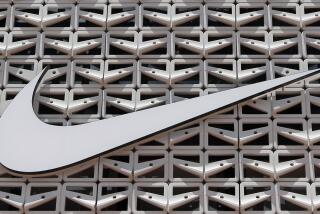Reebok Gets Its Second Wind : After Losing the Top Spot to Rival Nike, the Sneaker Maker Is Picking Up Speed
- Share via
For a fellow taking a serious cut in pay, Paul B. Fireman is looking very chipper these days.
In part, that’s because Fireman--as chairman, president and chief executive of sneaker marketer Reebok International--still figures to earn as much as $2 million this year in salary and bonuses. It’s a far cry from the $14.8 million he pocketed last year, but not too shabby.
Perhaps more importantly, Fireman’s company--after stumbling for a few years and being outpaced by archrival Nike Inc.--now seems to be the one walking on air.
Reebok’s profits have jumped over the last six months, and most analysts expect more of the same despite the recession. Its stock, despite falling $1.75 to close at $21.125 on Monday, is up more than 150% since October.
The company is also cranking out new lines of shoes that bring it closer to its goal of filling nearly every segment in the athletic and casual footwear business.
“They’re driving the (sneaker) business to a certain extent. They’re not just following, the way many shoe companies do. They’ve taken command,” said Robert Carr, editor of the Inside Sporting Goods newsletter.
Then again, Reebok has ridden high before, only to see its growth slow and its earnings slide. Back in 1986, when the American sneaker business was less than half of its current size, Reebok was the industry’s kingpin with a 31.2% share of the U.S. market. But Nike came back swiftly, and as of last year, Reebok was back in the No. 2 spot with a 23.4% share.
Fireman, 47, drew most of the blame for the off years. Industry observers suggest that he spent too much time on his six-handicap golf game and on his unsuccessful effort to buy the New England Patriots football team and devoted too little attention to what was going on at company headquarters in Stoughton, Mass.
For his part, Fireman conceded that he went after the Patriots because he “needed some different things in my life.” Fireman described himself as “maybe a little despondent” over what was going on at the company at the time, which apparently included friction between him and Reebok’s largest shareholder then, British investor R. Stephen Rubin.
Last month, however, Fireman reduced the role of his sometime-nemesis through a $396.1-million stock buyback that cut Rubin’s stake in Reebok to 13% from 31.6%. Now Fireman and his wife, Phyllis, together have the company’s biggest stake, 18.5%.
Fireman put himself firmly back in charge of Reebok’s day-to-day operations in late 1989, after ousting two key executives who had been brought in from Hollywood, ostensibly to give the company more professional management. As an executive, Fireman generally gets high marks from Wall Streeters and other industry observers, even though his breezy personal style sets him apart from many big-company chief executives.
He is gregarious and approachable, a witty story-teller with a common touch. Fireman has no college degree, having left Boston University early to join his family’s fishing and hunting equipment distributorship. He still plays poker every week with his boyhood buddies and is forever struggling to keep his waistline in check.
Fireman also freely takes pot shots at his rivals, a practice most corporate chieftains disdain.
For instance, Fireman derided L.A. Gear--the Marina del Rey-based firm that is the nation’s No. 3 sneaker firm--as “quick hype” and “not a primary competitor.”
“They have an image problem,” Fireman said. “They prostituted their product. They’re (sold) everywhere, practically in gas stations.”
Kevin Ventrudo, L.A. Gear’s chief financial officer, called Fireman’s comments “off the mark.”
“I’m shocked,” Ventrudo said. “I would have thought he would have taken a higher road than that.”
Fireman calls Nike, along with Reebok, the “twin pillars” of the sneaker business but still manages to tweak his company’s chief competitor and its chairman, Philip Knight. While Reebok has been quick to copy Nike’s innovations, Fireman notes that Nike has been slower to follow Reebok’s marketing breakthroughs, such as its women’s aerobics shoes and “The Pump,” an inflatable air bladder installed in athletic shoes.
“Unlike Nike, I jump in fast,” Fireman said. “If it’s a good business, it’s a good business.”
Nike would not comment directly on Fireman’s remarks but cited a recent TV interview in which Knight cited “very basic differences in the values of the two companies. We (Nike) are an authentic sports and fitness company. I don’t quite know what they are.”
Fireman can be critical of his own company, too. He says Reebok, under the old management team he installed, became too bureaucratic and lost touch with consumers. Company executives also acknowledge that expenses ballooned, the most obvious example being Fireman’s salary.
Over the last five years, Fireman’s salary and bonuses totaled nearly $70 million under a contract that linked his compensation to the company’s pretax earnings. After that contract expired, Fireman agreed to a new deal that caps his annual pay at $2 million.
“It’s certainly an outrageous amount of money to be paying anyone,” Fireman said of his past compensation. But, he added: “I’m not ashamed of getting it. I brought fantastic value to the company.”
Founded by Fireman in 1979, Reebok skyrocketed into a company with profits of $176.6 million on sales of $2.16 billion last year.
Profit margins have narrowed in recent years, largely because of pressure from Nike. When Nike broke new ground by becoming the first sneaker firm to advertise nationally on television, it struck a chord with consumers. When Reebok first countered with TV ads of its own, they fell flat, particularly its ill-fated “U.B.U.” campaign.
Reebok also was distracted with the job of absorbing its string of acquisitions, including such shoe and apparel companies as Avia, Rockport and Ellesse. Still, until the recession arrived, Rockport blossomed under Reebok’s ownership, and Ellesse--despite its upscale image--is thriving in the face of the slowdown in retailing.
“The results you’re seeing now is the payoff from what they’ve been working on the last couple of years,” said John Horan, publisher of Sporting Goods Intelligence.
Fireman even is optimistic about Boston Whaler, a boat manufacturer bought by Reebok that has been hit hard by an industrywide slump. He said he expects to tap Reebok’s ample cash flow to push ahead with more acquisitions of leisure and recreation companies starting next year.
For now, though, Reebok still revolves around the athletic shoe business. What has reinvigorated the company as much as anything else is The Pump, which was introduced in November, 1989, in Reebok’s basketball sneakers and now is also being put into eight other types of footwear, including the company’s golf, walking and aerobics shoes.
The Pump often is derided as simply a marketing gimmick, but not only has it sold well, it has lent cachet and boosted sales of less expensive Reeboks. The Pump also cemented the company’s place in the men’s sneaker business, making it the first in the industry to cross over successfully from the women’s business.
Reebok’s original innovation was a women’s aerobics shoe, a huge hit through mid-1980s after a grass-roots marketing campaign in which droves of aerobics instructors were handed free sneakers. Now the company is trying to reignite its aerobics shoe business by pushing Step Reebok, a step-climbing workout program intended to create demand for its new “Step Trainer” sneakers.
It also is pushing the idea of basketball as a two-season sport to persuade athletes who already own one pair of basketball sneakers to buy a second pair--namely, one of Reebok’s new lines of durable “Blacktop” sneakers--for outdoor summer games.
Aren’t consumers’ closets already overcrowded with too many types of sneakers? Apparently not overseas, where Reebok’s already-booming business shows no sign of slowing.
Moreover, Fireman believes that the sneaker business still hasn’t reached the saturation point in this country. It’s just a matter, he said, of coming up with more good ideas.
Sneaker Race Based on a total U.S. wholesale market of $5.6 billion for branded athletic shoes. 1990 Nike: 28.4% Reebok*: 23.4% L.A. Gear: 12.0% Keds: 5.0% Converse: 4.0% Others: 27.2% *Includes Avia 1986 Reebok: 31.2% Nike: 20.2% Converse: 7.3% Adidas: 6.1% Puma: 3.9% Others: 31.3% Source: Sporting Goods Intelligence of Glen Mills Pa.
More to Read
Inside the business of entertainment
The Wide Shot brings you news, analysis and insights on everything from streaming wars to production — and what it all means for the future.
You may occasionally receive promotional content from the Los Angeles Times.










